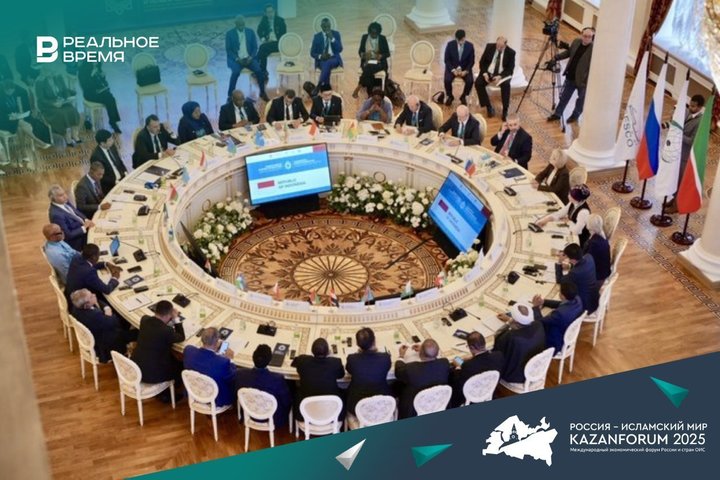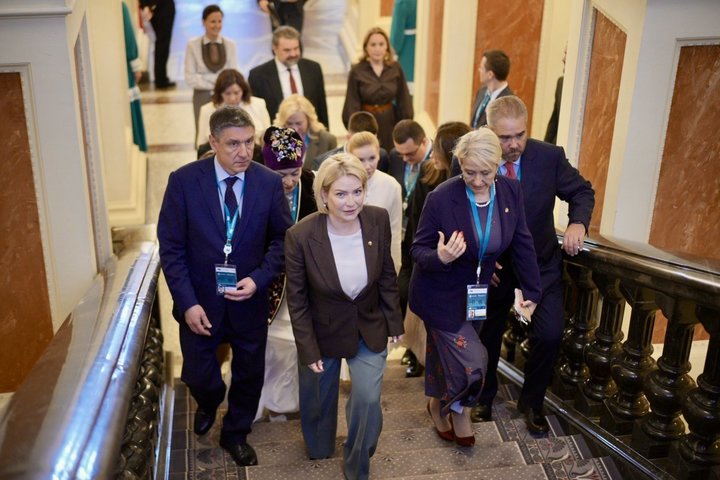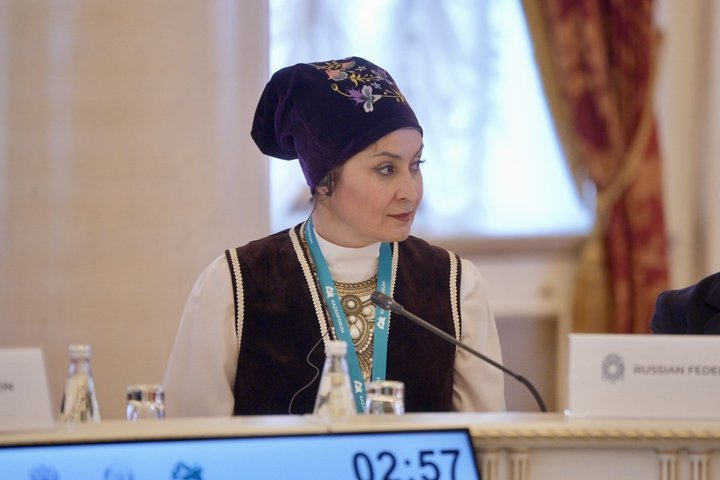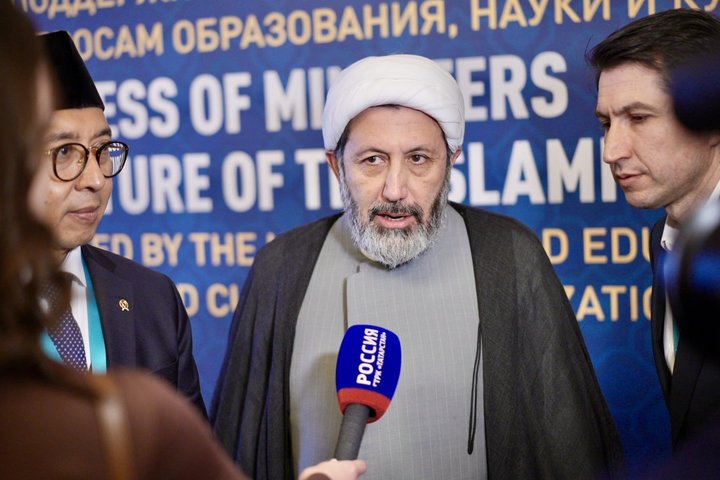Olga Lyubimova: ‘We are ready to use the full potential of Russian culture’
Representatives of 18 countries gathered in the Kazan City Hall

On 15 May, ministers of culture, as well as their deputies, ambassadors extraordinary and plenipotentiary of the OIC countries met in the Kazan City Hall during the economic forum Russia — Islamic World: KazanForum-2025 — representatives of 18 countries arrived in the capital of Tatarstan. The guests talked about a multipolar world, cultural exchange, and also noted that they need to meet more often, because there are many common topics. And ahead are events related to Kazan as the capital of the Islamic world in 2026. Read more about it in the report of Realnoe Vremya.
“We live in a globalized village”
In February 2025, at the XIII Conference of Ministers of Culture of the Organization of Islamic Cooperation (OIC) in Jeddah, it was decided that Kazan would become the cultural capital of the Islamic world in 2026. Today, the plenary session of ministers Dialogue of Cultures — the Basis for Preserving Identity and Diversity in a Multipolar World was held in the Kazan City Hall. This congress is preparation for this global event.
“In modern geopolitical conditions, when the illusion of a unipolar world is disappearing before our eyes, new paths of economic interaction are being built, culture faces a responsible task,” said Russian Minister of Culture Olga Lyubimova, who was part of the delegation in Jeddah. “It is precisely this that can contribute to improving the global situation and achieving a new level of global partnership. The Ministry of Culture of the Russian Federation, like our colleagues from the Islamic world, sees the solution to this problem through the preservation of traditional values and the cultivation of respect for history.”

Lyubimova noted that this year the Russian Seasons (led by the Mariinsky Theatre and the Academy of Russian Ballet) were held for the first time in Oman and Bahrain. Events are planned in Iran, Egypt, Morocco, the United Arab Emirates, Qatar, Kuwait, Tunisia, Indonesia and the CIS countries: Azerbaijan, Kazakhstan, Kyrgyzstan, Tajikistan, Turkmenistan, Uzbekistan.
“We are ready to use the full potential of Russian culture, which includes about 3,500 museums, over 600 theatres, more than 42,000 libraries, and in total — almost 100,000 cultural institutions throughout our vast country,” Lyubimova noted.
The meeting was moderated by the Deputy Prime Minister of the Republic, Leyla Fazleyeva, who stood out from the crowd in a bright kalfak and camisole. Kazan has already hosted many international events, she recalled. And she gave the floor to the Director General of the Islamic Organization for Education, Science and Culture, Salem Bin Mohammed Al-Malik.

“I asked what language I should speak in, and I was asked to speak in English. Otherwise, I would certainly choose Russian,” he began his speech and noted that approximately 60% of the world's cultural heritage is at risk of disappearing. “We hope that the Russian Federation will help us preserve and reduce this list.”
Al-Malik also said that Kazan will host a congress on the preservation of the cultural heritage of Islamic countries.
“I hope that we will move forward, relying on the past and the future, where identity, diversity and culture will be the beacons that will lead us to peace,” the CEO summed up.
“We live in a globalized village,” supported his colleague, Director of the Department of Culture of the Organization of Islamic Cooperation (OIC) Hussein Razouie. “We have information technology, the development of mass media, social platforms. Cultural dialogue is becoming a strategic tool between different people of different nationalities, which helps to achieve different perspectives, overcome negative stereotypes and combat hatred.”
“Existing mechanisms simply cannot ensure the security of these regions”
Turko Daudov, Permanent Representative of the Russian Federation to the Organization of Islamic Cooperation in Jeddah, recalled that this year marks 20 years since Russia received observer status in the OIC. The representative of the League of Arab States in the Russian Federation, Walid Hamid Shiltagh, also spoke about this:
“Popularization of our cultures is also the best way to introduce the world to the true values of Arab and Islamic civilizations in order to prevent their distortion and malicious use by terrorist, extremist and anti-Islamic groups.”
Shiltagh also expressed gratitude on behalf of the organization to Russia for categorically condemning incidents of desecration of the Holy Quran.
“The multipolar world is experiencing quite a lot of pressure due to military conflicts that are taking place in various countries,” added the minister of culture of the Republic of Indonesia Fadli Zon. “There are many geopolitical problems, and we see that many existing mechanisms and systems simply cannot ensure the security of these regions.”

Interfaith, interregional Kazan
In particular, the Indonesian Minister noted the situation in Gaza, where hundreds of cultural sites have been destroyed since October 2024. By the way, one of the last to speak at the meeting was the Adviser to the Embassy of Palestine for Public Relations in the Russian Federation Samir Mohammed Abu Saleh. His speech was far from cultural issues. Saleh recalled that today marks 77 years since the exodus of about 725,000 Palestinian Arabs as a result of the Arab-Israeli War and the Six-Day War.
“Israel continues to be considered the only democratic state in the Middle East, but for 18 months now it has been pursuing an aggressive policy against the civilian population, which leads to great destruction and a large number of civilian casualties,” Saleh said.
In particular, Saleh voiced a demand to hold an international conference on the reconstruction of Gaza, which requires at least $80 billion.
We need to meet more often, suggested the Chairman of the Organization for Culture and Islamic Relations of the Islamic Republic of Iran Mohammad Mahdi Imani Pour. And he named several topics: human rights, education of youth, an ideal family, the future of the world, the formation of a new global civilization, the constructive and destructive effects of AI.”
“We have something to show in Kazan as an example of what interaction can look like — interreligious, interregional, interfaith,” Lyubimova summed up in a conversation with journalists. “We have something to show as successful examples for our young generation and for the older generation, the most beloved visitors of our cultural institutions. We talked about the fact that from our largest legendary federal cultural institutions to the smallest municipal ones, we are ready for dialogue, for joint projects. Ahead of us is one big common cause: 2026, Kazan is the cultural capital of the Islamic world.”